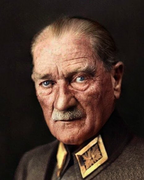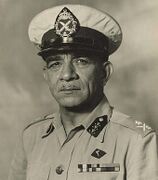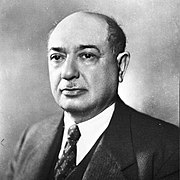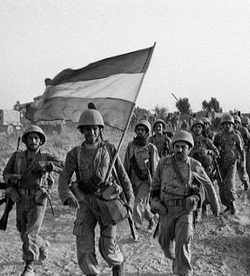Union Fathers
The Union Fathers (Pasdani: پدران اتحاد; Ettehad-e Pedarân) were a group of Zorasani leaders, who led the unification of the country from 1946 to 1980. The original group was proclaimed by the government of Ataollah Shahedeh in 1985. The group was expanded by three in 2015, with a second Proclamation of Reverence.

The Proclamation of Reverence identified the Union Fathers as, Mahrdad Ali Sattari, Ali Sayyad Gharazi, Mustafa al-Kharadji, Saad al-Sallal, Yadollah Shariatzadeh, Habibollah Mousavi, Erkin Dostum and Abdullah al-Atassi. The Proclamation declared them to be “individuals of esteemed capability, patriotism and revolutionary commitment. Without whom, our great Union would not exist.” All eight individuals served in prominent positions within the Union of Khazestan and Pardaran, which was the precursor state to the UZIR. The Proclamation placed emphasis on their actions as laying the foundations of the Union, rather than focusing on the figures who oversaw the actual establishment of the Union in 1979 and 1980. This was purportedly done in respect to their roles in producing the ideology that drove the unification process as well as “leading the spiritual mobilisation of the Zorasani people toward overcoming the monarchist menace and the spectre of imperialism.”
In 2015, the Proclamation of Reverence was amended to include Javad Jahandar and Ataollah Shahedeh, who oversaw the founding the Union, and Ershan Shariatmadari, the Commander-in-Chief of the Zorasani Revolutionary Army during the Irvadistan War. The amendment also proclaimed Ali Sattari as the Eternal Father of the Union.
Today, they are widely referenced by Zorasani politicians, usually those of the Sattarist right in rhetoric and point. They collectively retain a unique place in Zorasani society and are subject to state-led civic traditions and adoration.
Background
The formation of the Union of Khazestan and Pardaran, out of the revolutionary governments of Pardaran, Khazestan and Ninevah in 1953 is widely considered to be the most pivotal event in Zorasani Unification, as it established the state from which unification could be effectively pursued. From its inception, the UKP became the primary vehicle for unification, specifically overcoming resistance in the Irvadistan War to evolve into the UZIR. The 1985 Proclamation states, “had the Union Fathers not existed or at any point in their great journey failed or been defeated, the cause of unification and the cause of Sattarism would have been lost to history.” Except for Saad al-Sallal, all seven had been involved with the Pardarian Revolutionary Resistance Command from its creation in 1924, with several serving in leading positions throughout its existence. Al-Kharadji, despite being Khazi, had served as a battalion commander with the PRRC during the Solarian War, before returning to Khazestan to establish the Khazi Revolutionary Resistance Command.
Original Union Fathers
- Mahrdad Ali Sattari (1880-1956): the leading figure of the unification process and separately proclaimed the Eternal Father of the Union. Sattari was born to a peasant family near Borazjan, in the Etrurian colony of Cyracana. Owing to the deprivation he was raised in, Sattari joined the Colonial Auxiliary Force of Cyracana, before being transferred to serve with the Imperial Pardarian Army of the puppet Shahdom. During his military service, he became involved with Pan-Zorasanism and nationalism and set up a series of secret societies within the IPA dedicated to spreading these ideals. His desire for a revolution that would overthrow the various Etrurian colonies and the Shahdom led him to establish links with Irfanic clerics, who for decades had been propagating Pan-Zorasansim as a religious obligation. Beginning in 1914, with the assistance of close associates inside and out of the IPA, Sattari organised the Tabarzin nationalist militia and the Khordad Rebellion, which would last from 1918 until 1921. The rebellion was defeated by Etruria and forced him and others into exile in Xiaodong. In 1924, with the aid of Xiaodongese supporters, Sattari founded the Pardarian Revolutionary Resistance Command and formulated the Pan-Zorasanist ideology known as Sattarism. He would lead the PRRC to retake southern Pardaran during the Great War and resisted a Etrurian counterattack during the Solarian War, before going on to lead the PRRC to victory in the Pardarian Civil War. In wake of the Khazi Revolution and the Rahelian-Kexri conflict, he led the tripartite talks which led to the founding of the Union of Khazestan and Pardaran. He became the Supreme Leader of the Union upon its foundation and governed the UKP for three years before his death in 1956.
- Mustafa al-Kharadji (1903-1963): A Khazi, who went on to become a civil servant in the Etrurian colony of Rahelia Etruriana before being transferred to work with the Etrurian Colonial Office in the Shahdom of Pardaran. There, he became involved with the PRRC cadre in Zahedan, joining the armed group during the Great War. He went on to command a battalion of PRRC troops during the conflict and rose through the political hierarchy, obtaining a seat on the Revolutionary Resistance Command Council in 1938. He then served as a brigade commander during the Solarian War and upon its end, was dispatched to his native Khazestan to establish a sister movement. Al-Kharadji proved highly charismatic and capable, leading the Khazi Revolutionary Resistance Command to capture the southern city of Abassiya during the early states of the Khazi Revolution, before orchestrating the KRRC’s seizure of leadership of the revolt that overthrew the Khazi monarchy in November 1953. Kharadji then played the leading role in the Khazi-Pardarian intervention in Ninevah, leading to the downfall of the Kexri Republic. Al-Kharadji emerged as one of the most vocal and influential figures for unification and oversaw the establishment of the UKP with Sattari. Following unification, he served as the State Councillor for Khazestan on the Central Command Council and a series of cabinet positions, before retiring due to ill health in 1958.
- Saad al-Sallal (1903-1978): A Ninevahi, who served as an officer in the Colonial Auxiliary Force of the Etrurian protectorate of Ninavina. He defected from the CAFN in 1920 to fight with the Khordad Rebellion in Pardaran. He went into exile to Xiaodong with the leadership, rising to become one of the leading authors of Sattarism. Following the creation of the PRRC, he was appointed Commander of the 4th Banner Army, tasked with capturing the Pardarian side of Lake Zindarud. He became highly acclaimed commander during the Solarian War and Pardarian Civil War, leading the 4th Banner Army to victory in what would become the Armavand and Saravan Union Republics. In 1949, he crossed Lake Zindarud and settled in the town of Qesirdîb, where he established the Ninevahi Revolutionary Resistance Command and commanded the Rahelian militia and guerrilla forces against the Free Kexri Republic. He led the war effort for two years, before being appointed head of the Ninevahi Provisional Revolutionary Government in 1953 following the joint Khazi-Pardarian intervention. He, alongside Sattari and Al-Kharadji conducted the talks on organising the formation of the UKP. From 1953 until 1958, he served as the State Councillor for Ninevah and as Minister of Defence until he was assassinated by Kexri nationalists in 1978. He was described Sattari as his “warrior comrade.”
- Habibollah Mousavi (1883-1964): A Pardarian who was present beside Sattari from the Khordad Rebellion through to the UKP. Mousavi was a civil servant in the Etrurian Colonial Office for the Shahdom of Pardaran and was noted for leaking valuable information to Pardarian nationalists in wake of the Khordad Rebellion. He is credited by the PRRC for organising the smuggling of weapons and illicit sale of explosives to the Khordad. With the failure of the Khordad Rebellion, Mousavi fled to Xiaodong where he became a prominent intermediary between the exiled leadership and the Xiaodongese government. He played a key role in the organisation and administration of the PRRC, doing so again in wake of the Great War, where he organised the governance of Southern Pardaran which fell under PRRC control. During the Pardarian Civil War, he proved himself a logistical genius, overseeing the supply of weapons and materiel for the PRRC’s forces. Following the formation of the UKP, he served as the Minister for Industry, before being appointed First Minister under Ali Sayyad Gharazi. He died peacefully in his sleep while in office.
- Yadollah Shariatzadeh (1883-1961): A Pardarian, who served as a commander in the Khordad Rebellion, Great War, Solarian War and the Pardarian Civil War, rising in the latter to become the Commander-in-Chief of the Pardarian Revolutionary Army. Shariatzadeh was a capable commander and one of Sattari’s closest allies. Following the creation of the UKP, he went on to serve as the Minister of Defence and reorganised the newly Zorasani Revolutionary Army. From 1953 until 1961, his primary responsibilities were expanded to oversee the military’s role in Normalisation. Shariatzadeh is credited with the established militarism of Zorasani society which continues to this day, with his various speeches and publications presenting the military as a near-mythical force. Following the death of Ali Sattari in 1956, he served as acting First Minister during the power struggle between Ali Sayyad Gharazi and Hossein Khalatbari to succeed Sattari as Supreme Leader of the Union. In 1960, he retired from office and died a year later.
- Ali Sayyad Gharazi (1917-1972): A Pardarian and the youngest Union Father, Gharazi was born during the Khordad Rebellion to a partisan fighter and a propagandist mother. His family were among the first to be sent to Xiaodong by Sattari to establish a safe haven in 1919 and would not return to Zorasan until 1930 during the PRRC’s entry into the Great War to seize Pardaran from Etruria. He served as a child soldier, distinguishing himself with heroism. During the Solarian War, he rose to command a platoon. He was promoted to the rank of major upon the outbreak of the Pardarian Civil War where he further distinguished himself. By the war’s closing stages he commanded a division during the final offensives against the Ashkezar Republic. Out of recognition for his service he was promoted to the rank of brigadier general and granted a seat on the Central Command Council as the head of the National Spiritual Mobilisation and Propagation Department. Gharazi’s appointment resulted in him becoming the principal propagandist of the UKP, and its public face. His personal popularity and charisma saw him front the unification effort, establishing close ties to several leading Khazi regime officials, notably Mustafa al-Kharadji, who would be key to Gharazi’s replacing of Khalatbari as Supreme Leader of the Union in 1957. Gharazi would serve as leader of the UKP from 1957 until his death in 1972, leading the UKP through the Rahelian War.
- Erkin Dostum (1904-1975): A Togoti, Dostum was raised on the Great Steppe to a family of herders before settling in the city of Sandsar where he worked in an Etrurian-owned steel mill. He became involved with a Pardarian nationalist group in 1920, where he became enraged by the failure of the Khordad Rebellion. He went on to take charge of the group and transformed it into a political cadre of the PRRC in 1925. With the outbreak of the Great War, Dostum led the cadre into instigating a rebellion among the Sandsari population, which though crushed by the Etrurian Army in 1929, secured him a reputation for revolutionary zeal. He and most his aides escaped to southern Pardaran where he linked up with the PRRC. Following a presentation to Sattari, he was appointed the Commander of the Western Region with the aim of mobilising the Togoti population against the Etrurians. Following the Solarian War, where he proved a relatively adept commander, he led the 5th Banner Army into the Great Steppe, defeating the Shah’s forces. In wake of the Solarian War, Dostum secured a position on the Central Command Council and led the Normalisation in the Great Steppe, which involved the destruction of traditional Togoti living, nomadism and cultural independence. In 1956, he was appointed Overseer of the Normalisation Process, sending him across the UKP. Opponents of the UKP regularly described Dostum as a “butcher”, “mass murderer” and “genocidal beast.” As the Overseer, he is responsible for the deaths of an estimated 306,000 people, including the Resettlement of the Kexri Patriots, a forced displacement of the Kexri population across the entirety of the UKP from their homeland in Ninevah.
- Abdullah al-Atassi (1914-1976): A Khazi, Al-Atassi was born to a middle-class family in the Khazi capital of Faidah, becoming a university lecturer in history. In 1937, he was arrested and sentenced to death by Etrurian colonial authorities for teaching students Zorasani history in manner construed to be fermenting violence. He reportedly told students, “every Zorasani soul that had lived will rise up with you, their hands guiding your bayonets into the stomachs of the oppressors.” He was saved from execution by a PRRC ambush on his train travelling to the prison at Cancello del Centurione. He joined the PRRC and was appointed to oversee the establishment of a political-revolutionary education in PRRC territory. In 1946, he established the Warrior Sons of the Struggle, a youth movement tasked with mobilising local communities in support of the PRRC during the Pardarian Civil War. In 1948, he was appointed the head of the Special Security Service, the PRRC’s secret police, before being appointed head of the National Revolutionary Tribunal, in which he oversaw the prosecution and execution of an estimated 3,800 suspected monarchists in Zahedan. He maintained this position upon the founding of the UKP, expanding his jurisdiction and remit to combat enemies of unification. Al-Atassi would hold this role until 1972 when he succeeded Gharazi as Supreme Leader of the Union. He was assassinated by an agent of the United Rahelian People’s Republic in 1976 during the first year of the Irvadistan War.
- Union Fathers
Mahrdad Ali Sattari,
Supreme Leader of the Union
(1880-1956)Mustafa al-Kharadji,
State Councillor for Khazestan
(1903-1963)Saad al-Sallal,
State Councillor for Ninevah
(1903-1978)Habibollah Mousavi,
First Minister of the Union
(1883-1964)Yadollah Shariatzadeh,
Commander-in-Chief of the Zorasani Revolutionary Army
(1883-1961)Ali Sayyad Gharazi,
Supreme Leader of the Union
(1917-1972)Erkin Dostum,
Overseer of the Normalisation Process
(1904-1975)Abdullah al-Atassi,
Supreme Leader of the Union
(1914-1976)








